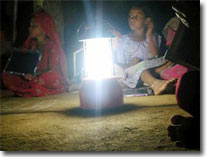Light up the life of 1 billion people
An Indian energy research organization has just begun to implement a project that brings cheap solar light to 1 billion people in India, Africa and underdeveloped countries in Southeast Asia like Cambodia, Laos, Myanmar.
The Straits Times news agency quoted Dr. RK Pachauri, chairman of the Institute of Energy and Energy Research (TERI), saying that this " Lighting 1 billion people " project will also aim to reduce carbon emissions and combat the climate changes. The project will be piloted first in India. Dr. Pachauri is the chairman of the United Nations Intergovernmental Panel on Climate Change and recently won the recent Nobel Peace Prize with former US Vice President Al Gore.
According to TERI data, there are currently 1.6 billion people in the world without electricity, of which 400 million belong to 76 million households in India. TERI calculates that 65 million households use kerosene burners and consume 2.4 billion liters of oil a year, emitting 5.9 million tons of CO2.

An evening class is lit by solar lights in rural India (Photo: Flickr)
Meanwhile, TERI's solar lamps are similar in shape to oil lamps but run on solar batteries, thus emitting very little CO2.
The price of a lamp is quite expensive, about 3,600 rupees (83 USD), but TERI said that rural people can rent for only 2-3 rupees a day, which is equivalent to the amount of buying light oil. According to TERI, the total cost of supporting all 65 million Indian households is estimated at US $ 5.3 billion, only 50% of the cost because kerosene is subsidized by the Indian Government each year.
Moreover, according to TERI, the light quality of solar lamps is better, thereby reducing the visual diseases caused by using oil lamps.The Straits Times said TERI now provides solar lights to villages without electricity in seven states in India. The project will also be expanded to Africa and Southeast Asia in the near future.
HIEU TRUNG - Youth online (According to TST)
- Camera captures 1,000 billion images per second
- The US produces about one billion light-years of sunlight
- Life on Earth may have started over 4 billion years ago
- Ancient galaxies are suitable for life
- Things you don't know about the speed of light
- Evidence of 4 billion years of life on Earth is discovered
- Light affects the performance of workers
- Detecting mysterious light spots appearing on Mars
- Building light lighthouse in space to attract aliens
- Life on Earth will be destroyed after 3 billion years
- The landing of meteors 3.9 billion years ago has promoted life on earth
- Life began on Earth 3 billion years ago
 Is the magnetic North Pole shift dangerous to humanity?
Is the magnetic North Pole shift dangerous to humanity? Washington legalizes the recycling of human bodies into fertilizer
Washington legalizes the recycling of human bodies into fertilizer Lightning stone - the mysterious guest
Lightning stone - the mysterious guest Stunned by the mysterious sunset, strange appearance
Stunned by the mysterious sunset, strange appearance